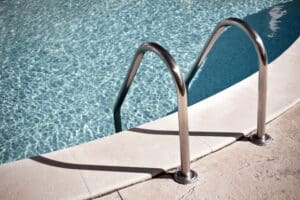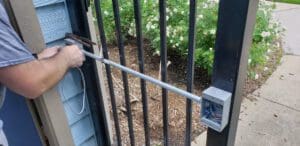Swimming Pool Gate Locks & Access Control – Security For Homeowners Associations
If you’ve ever been in charge of managing a community or public pool like on behalf of a homeowner’s association, you know what kind of headache security measures and managing pool-goer safety can be.
Even in Texas, (which we’ll be covering today as your local locksmith), rules are strict when it comes to securing a public pool legally. There are also several types of swimming pool gate locks and other options that you may consider to protect your pool from uninvited guests as well as prevent accidental drowning and injury; particularly in children.
So this summer your favorite Houston Locksmith will discuss exactly what rules must be followed to legally operate these pools, as well as convenient and effective access control system installation options that can make managing swimming pool gate locks easier and safer for both you and your members!
HOA Pool Security – Why It Matters So Much
** Before we begin discussing the topic in earnest, let us be entirely clear and transparent. The laws and guidelines discussed in this blog article are those of the State of Texas. If you manage a public pool outside of Texas, please be aware that your local laws may differ. **
Texas regulates swimming pool gates and has written laws and statutes to ensure compliance. These rules are in place to protect children and bystanders from accidental drowning, injury, and death. According to the CDC, who tracks information regarding both fatal and nonfatal drownings, more children ages 1-4 die from drowning than any other cause of death except birth defects. Drowning is also the second leading cause of unintentional injury death after motor vehicle crashes for children ages 1-14.
But it’s not just children who frequently have accidents related to open bodies of water. According to the CDC, every year in the United States there are around 3,960 fatal unintentional drownings. The same figures estimate another 8,080 non-fatal drownings. This is not including boating-related non-fatal drownings.
HOA Gate Systems – Rules For Operation
We’ve now gone over some of the major reasons that pool safety is important. Let’s talk about security statutes in place for pool operation. In Texas; Title 9, Subtitle A, Chapter 757 of the Health and Safety Code states all swimming pools must be surrounded by fences that are at least 48 inches in height. Chain link fences are prohibited by these guidelines, to protect from children climbing over them.
No swimming pool fence in Texas may have a gap at the bottom or vertical fence slats that are big enough for a ball that is four inches in diameter to pass through. In addition to these rules, if a fence has both vertical and horizontal slats the slat attachments must be installed on the inward side of the fence.
Gates on swimming pool fences must also be at least 48 inches in height. They must be self-closing and self-latching, with the latch located on the inside of the gate. Gates must also swing inward, away from the pool. Any doors that lead to swimming pools must be self-closing and self-latching.
The door also needs a “keyless bolting device” that is 36 to 48 inches off the floor. Finally, if the wall of the house serves as one of the walls of the fence, the door leading to the pool needs an alarm that sounds when the door opens. These rules apply to any type of pool in Texas, residential or commercial. All above-ground swimming pools must abide by the same fencing and gate rules as in-ground pools to prevent unauthorized use.
Keys & Swimming Pool Gate Locks
In addition to the above; homeowners’ associations also must keep track of how residents access their pool. A common solution is assigning keys to swimming pool gate locks to residents, but using this option alone doesn’t come without its’ own headaches.
Most HOAs do what many other organizations managing public areas do. They call for commercial locksmith services in Houston TX in order to have keys that work correctly for their swimming pool gate locks. But, keys alone are not enough to ensure that your swimming pool is completely free of uninvited guests. Most keys, though not all, used on swimming pool gate locks are the exact same types of key blanks used in most homes.
What this means is that if you issue keys to residents, you have no way of preventing additional copies from being made. That means that anyone who allows a visitor to use their pool key could go to a box store, hardware store, or even just a local residential locksmith and make as many keys as they’d like. This also would mean that they could pass out those copies to anyone they’d like as well.
Some people feel safe because their keys read “DO NOT DUPLICATE” in large, capital letters stamped on the head. These keys may look different cosmetically, but the blade and teeth that actually work the swimming pool gate locks are identical. The “do not duplicate” or “DND” marking is just a suggestion, and isn’t a guarantee the key cannot be copied. Something else to consider is lost or unreturned keys, which would still work the lock cylinder until it was rekeyed. If the swimming pool gate lock isn’t rekeyed, keys from years or even decades before could allow someone to gain entrance to your association’s swimming pool gate locks who no longer is entitled to access.
Pool Gate Access Control Systems
So how should you control access to your pool? The answer is simple; Access Control. Access control systems are becoming increasingly common in commercial buildings and public locations such as swimming pools. The term “access control” collectively refers to systems designed to control access to an area using parts such as keypads, fob readers, biometric readers, magnetic locks or “maglocks”, electric strikes, and more. An access control system can be installed to work on a single door on one property or dozens across the country and allows auditing of who comes and goes based on the credentials used.
What this means for you as someone managing an HOA swimming pool is that each resident can be assigned a credential to operate the swimming pool gate locks without the need for any keys being cut. This allows auditing of who comes and goes, as well as the ability to remotely modify valid and invalid credentials. So for example; if someone moves away or security has been compromised on-site, all it takes for you to restore peace of mind is to simply change the code or delete the badge for the former resident.
While most systems operate with a keypad or fob reader, some access control systems are operated by the use of what’s called “mobile credentials”. A mobile credential is simply using a cellular device to operate the swimming pool gate locks via Bluetooth connection.
In other words, your mobile device is your credential, and it allows the swimming pool gate locks to operate based on the proximity of the device instead of having to present it to the reader. This means that to the resident or other end-user, the swimming pool gate locks will simply always open when they approach. After they leave the vicinity of the swimming pool gate locks, it would automatically lock back and prevent entry to those without a mobile credential.
Most modern forms of access control are termed “electronic access control“. Electronic access control requires power and usually wi-fi as well, which may or may not be available for your specific swimming pool gate locks. Some access control providers even have cellular connectivity abilities, so wi-fi may not even be required. However, mechanical access control solutions like Simplex locks do exist for situations where power and internet connections are untenable, or where a cellular connection isn’t an option.
Swimming Pool Gate Locks & Access Control With Guardian Safe & Lock
As you can see, the “best” form of security in regards to HOA pool gate locks tends to be a combination of traditional key systems set up by a professional locksmith and access control. The key systems allow a mechanical override of electronic access control, while the access control system handles and simplifies access to residents or other users.
Access control can be more expensive than simply using keys in the short term. However, over the course of time and replacing or rekeying swimming pool gate locks, a key system alone can dwarf the initial cost of an access control installation. A common way organizations make these systems more affordable is to bill residents $10-$20 for access fobs. With enough residents, this fee could theoretically pay for the entire system.
Luckily, Guardian Safe & Lock provides both locksmith services as well as access control installations. We also perform security camera installation service, commercial hardware installations, and security safe services and safes for sale in Houston. The Greater Houston Area knows exactly who to call whether they need a Katy Locksmith or a Locksmith in Conroe TX, and that’s Guardian Safe & Lock. Give us a call today if your HOA pool gates need an access control installation for pricing or any other questions! 832-534-8687




